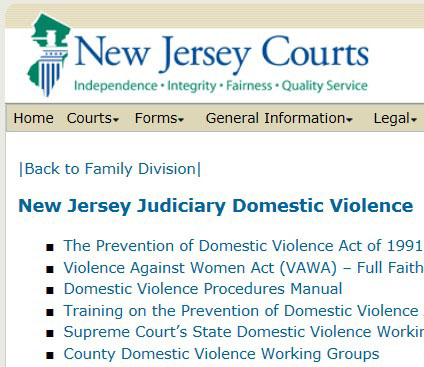Domestic Violence Law in New Jersey
We have over 21 years of experience handling domestic violence cases for both plaintiffs and defendants. Whether you are a plaintiff or defendant, a domestic violence case can have life changing consequences for everyone involved, including an impact on a defendant's present and future employment. Call us now for help in all aspects of your New Jersey Domestic Violence Case.
Quality and Responsive Legal Services
Law Offices of Kevin Crawford Orr • (973) 824-5520
New Jersey's Domestic Violence Law
If a finding of domestic violence is found by a New Jersey Superior Court Judge, the Judge may impose one or more of the conditions set forth in N.J.S.A. 2C:25-29(b), which provides:
b. In proceedings in which complaints for restraining orders have been filed, the court shall grant any relief necessary to prevent further abuse. In addition to any other provisions, any restraining order issued by the court shall bar the defendant from purchasing, owning, possessing or controlling a firearm and from receiving or retaining a firearms purchaser identification card or permit to purchase a handgun pursuant to N.J.S.2C:58-3 during the period in which the restraining order is in effect or two years whichever is greater, except that this provision shall not apply to any law enforcement officer while actually on duty, or to any member of the Armed Forces of the United States or member of the National Guard while actually on duty or traveling to or from an authorized place of duty. At the hearing the judge of the Family Part of the Chancery Division of the Superior Court may issue an order granting any or all of the following relief:
(1) An order restraining the defendant from subjecting the victim to domestic violence, as defined in this act.
(2) An order granting exclusive possession to the plaintiff of the residence or household regardless of whether the residence or household is jointly or solely owned by the parties or jointly or solely leased by the parties. This order shall not in any manner affect title or interest to any real property held by either party or both jointly. If it is not possible for the victim to remain in the residence, the court may order the defendant to pay the victim's rent at a residence other than the one previously shared by the parties if the defendant is found to have a duty to support the victim and the victim requires alternative housing.
(3) An order providing for parenting time. The order shall protect the safety and well-being of the plaintiff and minor children and shall specify the place and frequency of parenting time. Parenting time arrangements shall not compromise any other remedy provided by the court by requiring or encouraging contact between the plaintiff and defendant. Orders for parenting time may include a designation of a place of parenting time away from the plaintiff, the participation of a third party, or supervised parenting time.
(a) The court shall consider a request by a custodial parent who has been subjected to domestic violence by a person with parenting time rights to a child in the parent's custody for an investigation or evaluation by the appropriate agency to assess the risk of harm to the child prior to the entry of a parenting time order. Any denial of such a request must be on the record and shall only be made if the judge finds the request to be arbitrary or capricious.
(b) The court shall consider suspension of the parenting time order and hold an emergency hearing upon an application made by the plaintiff certifying under oath that the defendant's access to the child pursuant to the parenting time order has threatened the safety and well-being of the child.
(4) An order requiring the defendant to pay to the victim monetary compensation for losses suffered as a direct result of the act of domestic violence. The order may require the defendant to pay the victim directly, to reimburse the Victims of Crime Compensation Agency for any and all compensation paid by the Victims of Crime Compensation Agency directly to or on behalf of the victim, and may require that the defendant reimburse any parties that may have compensated the victim, as the court may determine. Compensatory losses shall include, but not be limited to, loss of earnings or other support, including child or spousal support, out-of-pocket losses for injuries sustained, cost of repair or replacement of real or personal property damaged or destroyed or taken by the defendant, cost of counseling for the victim, moving or other travel expenses, reasonable attorney's fees, court costs, and compensation for pain and suffering. Where appropriate, punitive damages may be awarded in addition to compensatory damages.
(5) An order requiring the defendant to receive professional domestic violence counseling from either a private source or a source appointed by the court and, in that event, requiring the defendant to provide the court at specified intervals with documentation of attendance at the professional counseling. The court may order the defendant to pay for the professional counseling. No application by the defendant to dissolve a final order which contains a requirement for attendance at professional counseling pursuant to this paragraph shall be granted by the court unless, in addition to any other provisions required by law or conditions ordered by the court, the defendant has completed all required attendance at such counseling.
(6) An order restraining the defendant from entering the residence, property, school, or place of employment of the victim or of other family or household members of the victim and requiring the defendant to stay away from any specified place that is named in the order and is frequented regularly by the victim or other family or household members.
(7) An order restraining the defendant from making contact with the plaintiff or others, including an order forbidding the defendant from personally or through an agent initiating any communication likely to cause annoyance or alarm including, but not limited to, personal, written, or telephone contact with the victim or other family members, or their employers, employees, or fellow workers, or others with whom communication would be likely to cause annoyance or alarm to the victim.
(8) An order requiring that the defendant make or continue to make rent or mortgage payments on the residence occupied by the victim if the defendant is found to have a duty to support the victim or other dependent household members; provided that this issue has not been resolved or is not being litigated between the parties in another action.
(9) An order granting either party temporary possession of specified personal property, such as an automobile, checkbook, documentation of health insurance, an identification document, a key, and other personal effects.
(10) An order awarding emergency monetary relief, including emergency support for minor children, to the victim and other dependents, if any. An ongoing obligation of support shall be determined at a later date pursuant to applicable law.
(11) An order awarding temporary custody of a minor child. The court shall presume that the best interests of the child are served by an award of custody to the non-abusive parent.
(12) An order requiring that a law enforcement officer accompany either party to the residence or any shared business premises to supervise the removal of personal belongings in order to ensure the personal safety of the plaintiff when a restraining order has been issued. This order shall be restricted in duration.
(13) (Deleted by amendment, P.L.1995, c.242).
(14) An order granting any other appropriate relief for the plaintiff and dependent children, provided that the plaintiff consents to such relief, including relief requested by the plaintiff at the final hearing, whether or not the plaintiff requested such relief at the time of the granting of the initial emergency order.
(15) An order that requires that the defendant report to the intake unit of the Family Part of the Chancery Division of the Superior Court for monitoring of any other provision of the order.
(16) In addition to the order required by this subsection prohibiting the defendant from possessing any firearm, the court may also issue an order prohibiting the defendant from possessing any other weapon enumerated in subsection r. of N.J.S.2C:39-1 and ordering the search for and seizure of any firearm or other weapon at any location where the judge has reasonable cause to believe the weapon is located. The judge shall state with specificity the reasons for and scope of the search and seizure authorized by the order.
(17) An order prohibiting the defendant from stalking or following, or threatening to harm, to stalk or to follow, the complainant or any other person named in the order in a manner that, taken in the context of past actions of the defendant, would put the complainant in reasonable fear that the defendant would cause the death or injury of the complainant or any other person. Behavior prohibited under this act includes, but is not limited to, behavior prohibited under the provisions of P.L.1992, c.209 (C.2C:12-10).
(18) An order requiring the defendant to undergo a psychiatric evaluation.
(19) An order directing the possession of any animal owned, possessed, leased, kept, or held by either party or a minor child residing in the household. Where a person has abused or threatened to abuse such animal, there shall be a presumption that possession of the animal shall be awarded to the non-abusive party.
SOURCE. Adopted. L. 1991, c. 261, §13, effective November 12, 1991. Amended. L. 1994, c. 94, §5, effective August 11, 1994; L. 1994, c. 137, §2, effective October 31, 1994; L. 1995, c. 242, §1, effective September 1, 1995; L. 1997, c. 299, §8, effective January 8, 1998; L. 1999, c. 236, §2, effective October 13, 1999; L. 1999, c. 421, §4, effective January 18, 2000; L. 2003, c. 277, §2, effective January 14, 2004; L. 2011, c. 213, §4, effective January 17, 2012.
We are prepared to handle any aspect of your domestic violence case.
Contact Us
At the Newark Law Offices of Kevin Crawford Orr, we can help with your domestic violence defense. Contact us today to find out more about your options.



![]() Office Location: 33 Washington Street, Ste. 1010 | Newark, New Jersey 07102
Office Location: 33 Washington Street, Ste. 1010 | Newark, New Jersey 07102 ![]()
